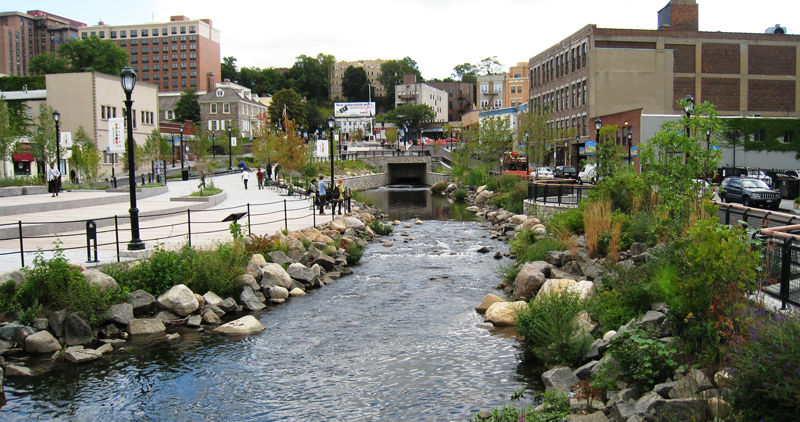
While many people regularly drive down the twisting Saw Mill River Parkway, few have seen the waterway after which it is named. For decades this tributary to the Hudson River was neglected, strewn with trash, and had sections covered with concrete. Today, the riverway is coming back as a result of joint community action.
For several years, The New York Community Trust – Westchester provided grants to Groundwork Hudson Valley to build community-based stewardship of the Saw Mill River and its watershed. In 2001, the organization created the Saw Mill River Coalition—which included municipalities, community groups, and environmental organizations—to work together to restore and protect the river corridor. A significant early Coalition victory “daylighted” the river in Yonkers, persuading the city to remove a parking lot that had covered the river since the 1920s. The city completed daylighting at two additional sections of the river in downtown Yonkers and is currently making plans for one more.
Groundwork has been advising municipalities on an action plan to improve the health of the river and its ability to absorb stormwater after heavy storms, such as the intense flooding after Hurricane Ida. It helped Yonkers develop its stormwater management next to municipal housing sites and collaborated with the city engineer on a flood-control berm to protect the riverbank and recent native-species plantings. It also advised Hastings-on-Hudson, Dobbs Ferry, and Mount Pleasant on their river action plans.
Groundwork is strengthening local stewardship groups—including emerging ones in Pleasantville and Thornwood—to advocate for the watershed and conduct invasive-plant and riverbank cleanups that have cleared away everything from fast-food wrappers to an old bathtub.
“Because restoring a river and its watershed is a long-term project, there needs to be consistent funding over the years and sustained community stewardship,” said Tara Seeley, the Foundation’s senior program officer. “Groundwork has helped all of our communities work together to restore aquatic habitat and elevate the visibility of the river as an urban and suburban amenity.”
Helping women rebuild their lives
Helping domestic violence survivors is a complicated and lengthy process. The Rehousing in Supportive Environments, or RISE, pilot program led by Caring for the Hungry and Homeless of Peekskill, My Sisters Place, and Lifting Up Westchester is using federal funds to find housing for domestic violence survivors. Westchester Community Foundation is making sure that other critical needs of these survivors are met.
“I am forever grateful to RISE for our new life,” said one mom. “I tried many times to leave in the past, but always went back because I couldn’t do it on my own. RISE gave us a safe place to heal and the finances and resources to do so. It took us a while to get adjusted, but RISE was there for us every step of the way! For the first time in a very long time, we felt safe. We were finally able to sleep peacefully at night and not worry.”
The program’s objective is to help survivors secure stable, affordable housing as a first step to long-term safety, employment, and self-sufficiency. RISE helps participants pay for childcare, transportation, school supplies, tuition, and rent arrears or other financial damage created by an abusive partner.
“Placing women, many of whom are mothers, in safe housing and then providing an array of supports can make an important difference in getting these families back to stability,” said Laura Rossi, vice president of The New York Community Trust – Westchester.